Gateway House launches first Quad Economy and Technology Task Force
The Task Force led by Gateway House will study economic and technological cooperation between the four like-minded democracies in the Indo-Pacific.
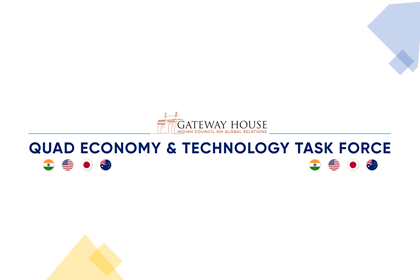 Courtesy: Gateway House
Courtesy: Gateway House
The Task Force led by Gateway House will study economic and technological cooperation between the four like-minded democracies in the Indo-Pacific.
 Courtesy: Debarpan Das
Courtesy: Debarpan Das
Following the lead set by the U.S. and Israel, India is now tapping its domestic start-up ecosystem for technological innovation and self-reliance in defence. Indian entrepreneurs are developing niche technologies which will boost the Indian military’s combat capabilities. They are also enabling the much-needed commercial synergy with Silicon Valley venture firms.
 Courtesy: World Economic Forum
Courtesy: World Economic Forum
In March 2021, the World Economic Forum (WEF) announced the addition of 15 manufacturing facilities to the prestigious Global Lighthouse Network. Two Indian companies were on the list – the Tata Steel facility in Jamshedpur, and the ReNew Power facility in Hubli. This is twice the number of Indian companies on the list last year. Many more facilities will likely be added to the WEF list, as several prepare to graduate their manufacturing businesses to keep up with Industry 4.0.
 Courtesy: Shutterstock
Courtesy: Shutterstock
The current notions of physical ‘permanent establishment’ or tangible locational nexus are not well-suited for the taxation of modern digital economy, especially for taxation of business income, rents or revenue creating activities. In a Covid-19 wrecked global economy, where government revenues are under severe stress, there is a compelling case for a market country or the value-creating jurisdiction to tax the income or rents attributable to the concerned market or location.
 Courtesy: Shutterstock
Courtesy: Shutterstock
With Oracle, Walmart and U.S. venture capitalists now holding the majority of TikTok Global’s shareholding, China’s closed digital world gets a breather, and the possibility of a truly open global Internet, gets a blow. China has won this round.
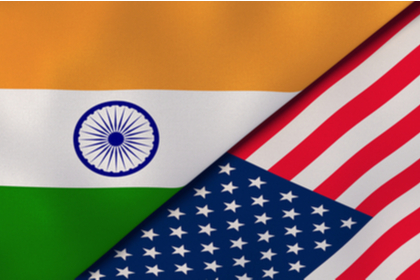 Courtesy: Shutterstock
Courtesy: Shutterstock
The recent rush of U.S. capital into India’s digital future, and India’s recent structural reforms, is the impetus for an attractive collaboration between the U.S. and India. To really succeed, the U.S. will have to support India with the same kind of technical assistance and best practices in areas like regulation, distribution, and innovation, that it gave China. The alternative is for India to follow Europe’s regulatory model, which places less of an emphasis on job growth and innovation.
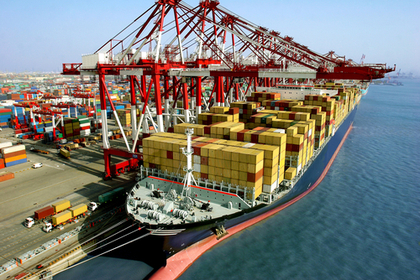 Courtesy: Shutterstock
Courtesy: Shutterstock
Globalisation has resulted in the interdependence of nations through the largely unimpeded transmission of investment capital and information, and integrated business operations. The leading beneficiaries have been the global 1%, and China. While it is too late and not possible to roll back an interconnected world order, globalization as we know it will recede, as will China’s standing in the world.
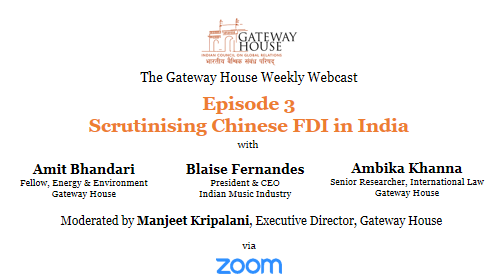 Courtesy: Gateway House
Courtesy: Gateway House
Amit Bhandari, Energy & Environment Fellow, Gateway House; Blaise Fernandes, President, Indian Music Industry Association; Ambika Khanna, Senior Researcher, International Law Programme, Gateway House discuss the reaction to China’s increased investment in HDFC, the depth and motive for China's investments in India, and the new FDI rules put in place by the government to protect strategic investments in the country.
 Courtesy: Ministry of External Affairs
Courtesy: Ministry of External Affairs
COVID-19 unified G20 leaders at an extraordinary summit last week. An idea given a nudge by Prime Minister Narendra Modi, here was an opportunity for all participants to put together a plan and make a pledge for international cooperation, focusing on four main themes. Next, will they be able to turn words into action?
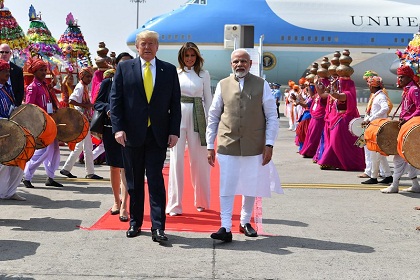 Courtesy: MEA/Flickr
Courtesy: MEA/Flickr
The outcome of the U.S. presidential elections could have a significant impact on the deepening Indo-U.S. bilateral. The partnership has grown substantially in the last two decades resulting in a deepening of economic and strategic relations. Defence dominates the strategic partnership and also stimulates the economic engagement. The newly signed BECA agreement is a testament to this. The next U.S. administration's policies will be critical for India, given repeated Chinese incursions into Indian territory on the Line of Actual Control at the border, the U.S.-China rivalry and China's ambitions to dominate Asia. Gateway House has an extensive repository of primary research, analysis and reporting on the Indo-U.S. bilateral, addressing issues such as trade, technology exchange and defence cooperation.